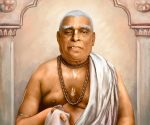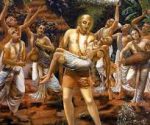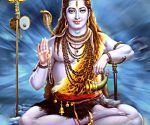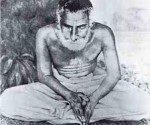Appearance Day of Sri Advaita Acarya
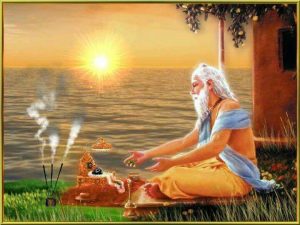 Srila Bhaktivedanta Narayana Gosvami, in Perth, Australia, January 31, 2001
Srila Bhaktivedanta Narayana Gosvami, in Perth, Australia, January 31, 2001
Advaita Acarya, Maha-Visnu, looks towards upadana-prakrti, the primordial power or ingredient cause of material nature. By His glance, upadana-prakrti transforms herself into the twenty four material elements. What are these? Five gross elements (panca-bhuta), five sense objects (tan matra), five knowledge-acquiring senses (jnanendriya), five working senses (karmendriya), mind (mana), intelligence (buddhi), false ego (ahankara), and the unmanifested state of the three modes of material nature (avyakta). [This is also explained in Bhagavad-gita 13.6] By the glance of Advaita Acarya, Maha-Visnu, upadana-prakrti produces all these elements.
Maha-Visnu, also known as Karanodakasayi Visnu, needs only to wish that prakrti (the material energy) will create, and by this she begins to act. But both must be present: purusa and prakrti, the Supreme Controller (Maha-Visnu) and His material energy. Alone, prakrti cannot perform any function. It is only by the wish of Karanodakasayi Visnu that prakrti begins to mix the elements in their appropriate proportions. Then, from her, unlimited universes manifest.
What is sambhu-tattva? From where does Sambhu (a manifestation of Lord Siva) come? Sambhu manifests from the union of the Supreme Lord with a transforming agent in form of the darkness aspect (tamo-guna) of maya, the minuteness aspect of tatastha-sakti, and a slight degree of the mixture of the knowledge aspect (samvit-guna) and pleasure aspect (hladini) of the spiritual energy (cit-sakti). [This is also explained in Brahma-samhita 5.45 (commentary)]
The original personality of Godhead is Lord Krsna. From Him comes Baladeva Prabhu, from Baladeva Prabhu comes Mula-Sankarsana in Dvaraka, from Mula-Sankarsana comes Maha-Sankarsana in Vaikuntha, and Maha-Sankarsana expands into Karanodakasayi Visnu. Only for the purpose of the creation of the material world does Karanodakasayi Visnu manifest. Karanodakasayi Visnu desires the creation of the material world: “Let there be a material world.” Maya is his desire potency (iccha-sakti), which is not pure because the desire is for material creation.
Mula-Sankarsana, Maha-Sankarsana, and all other incarnations have no desire for material creation. Not even by mind do they desire maya. But Karanodakasayi Visnu desires it, and He therefore looks towards maya. As visnu-tattva, Karanodakasayi Visnu is pure, but at the same time He is not pure tattva, eternal tattva, because He has some desire to create this world. Only for the creation of the material universes, as manifested from the Viraja River (the marginal area between the spiritual and material creation) is He is needed; otherwise not. Only for the purpose of creation will that form manifest. So He is not nitya-tattva, and eternal Truth. In the form of Maha-Sankarsana, visnu-tattva is eternal, but in the form of Karanodakasayi Visnu He is not.
So, He desired, or glanced over maya. Desiring means glancing. This desire to serve in the function of creation is the nimitta-karana, or the instrumental course, of this material world. But this desire, or glancing for the purpose of creation, is not completely pure. His desire to serve Krsna is pure, but the desire to create is called abhasa, a semblance of the original desire. This semblance is called Sambhu-linga, and the shadow of Maha-Visnu’s sakti in Vaikuntha, Ramadevi, is called prakrti. The shadow of Ramadevi and the shadow of Maha-Visnu unite, and in this way the creation takes place.
When Maha-Visnu (Karanodakasayi Visnu) desires this world to be created and unites with Maya (the shadow of Rama-devi), then Brahma (Brahmaa, with long a) is born. Brahma can be of two types: One is Hiranyagarbha Brahma, who is a direct expansion of Garbhodakasayi Visnu and is like Visnu Himself, and the other is Vairaja-jiva (Brahma who is a jiva, a living entity), who is like our four-headed Brahma. [This is also explained in Srimad-Bhagavatam 5.20.44, purport by Srila Bhaktivedanta Svami Maharaja] Of the two, Hiranyagarbha Brahma is superior, and He is like Garbhodakasayi Visnu; He induces our Brahma to act and do his duty.
Maha-Vishnu is also of two kinds: One is upadana-karana and the other is nimitta-karana (the ingredient and the instrumental causes. Nimitta-karana is Karanodakasayi Visnu himself, and upadana-karana is Advaita Acarya, who looks towards the upadana-prakrti, the ingredient-energy (unmanifested material nature). In this way, the twenty-four ingredients of the material world assemble. Karanodakasayi Visnu desires that these elements combine, and therefore they combine and manifest unlimited universes.
Advaita Acarya is a fraction of a fraction of a fraction of a fraction of Nityananda Prabhu. Nonetheless, in the pastimes of Sri Caitanya Mahaprabhu, they quarrel with each other in jest. Advaita Acarya is visnu-tattva, and Nityananda Prabhu is the head of the visnu-tattva. Externally they quarrel with each other, but actually they are glorifying each other, revealing their respective tattvas, or positions.
Today is the birthday of Advaita Acarya. He is very powerful, as can especially be understood by the fact that He brought Sri Caitanya Mahaprabhu to this world. Otherwise, there was no certainty when Caitanya Mahaprabhu would come. Krsna, in the form of Caitanya Mahaprabhu, wanted to come; but if He would have come by His own sweet will, perhaps He would have done so at the end of Kali-yuga. But Advaita Acarya called Him with Tulasi leaves, which are also very powerful. Along with offering Tulasi and Ganges water, Advaita Acarya called to Krsna: “Come at once; otherwise I will manifest My four arms and destroy the entire world.” He then heard an aerial voice: “Please don’t worry. Everything will be managed.”
Sripad Madhava Maharaja: Krsna had some fear that Advaita would destroy the world, so He came.
Srila Gurudeva: Very soon after that, Krsna appeared in the form of Caitanya Mahaprabhu to manifest His pastimes. It is for this reason that Advaita Acarya is called Gaura-ana Thakura, which means: “He who brought Caitanya Mahaprabhu.” He is also called Nada, which means: “He who can shake the throne of Krsna.” Advaita Acarya called, “Please come, Please come,” and Krsna came. Advaita Acarya Prabhu ki jaya! Jaya ho!
Syamarani dasi: Gurudeva, you said that Karanodakasayi Visnu’s desire to create the world was not pure, and therefore He is not purna-tattva or pure tattva.
Srila Gurudeva: He is not pure tattva like Narayana, Baladeva Prabhu, or Krsna. They are all visnu-tattva, but the three Visnus who are involved in creation, maintenance, and destruction of this world are not pure tattva. Actually, by tattva they are pure, but not by their action or desire. After the destruction of this world, Ksirodakasayi Visnu will enter into Garbhodakasayi Visnu, and Garbhodakasayi Visnu will enter into Maha-Visnu (Karanodakasayi Visnu). Advaita Acarya also will enter into Maha-Visnu. The whole creation will enter in Maha-Visnu. And Maha-Visnu will enter into Maha-Sankarsana.
Dhristadyumna dasa: Gurudeva, in your Prabandhavali lecture you explained that the efficient cause is compared to a judge who orders a policeman to capture a criminal. The policeman is likened to the upadana, the ingredient cause. But actually, the cause of the problem is the criminal’s actions. So, is it by the desire of the living entities to enjoy that Krsna manifests this creation, or does He desire to manifest the creation and then the living entities…
Srila Gurudeva: Loka-vat lila-kaivalyam (Brahma-sutra 2.1.34). This means: “Why should He not perform a pastime like this?” Nothing happens without His desire. He desires a pastime wherein the jivas forget Him. Otherwise the eternal, pure jiva could never forget Him, even though in the tatastha position. Even in the tatastha position the jiva is pure; therefore how can he forget Krsna? Everything happens due to Krsna’s desire.
In Jaiva-dharma, Vrajanatha asks his gurudeva. “It seems that Krsna is not merciful. Why is He acting like this?” His guru answers: “Why not? This is one kind of pastime. Without this type of pastime Krsna would not be complete; so it must be there.”
When Sri Advaita Acarya was a young child, he was exceedingly beautiful, with eyes like lotus petals. One day His father took him to the king’s palace, where a large deity of goddess Durga was being worshiped, with many arms and wearing a garland of the demons’ skulls. Many people were present, including the king, who also honored and worshiped the goddess.
Advaita Acarya’s father prayed to the goddess with folded palms, but his son, Kamalaksa (Advaita Acarya’s childhood name), who was about five years old, would not pay pranamas. The king became upset and told Kamalaksa’s father, “Your child is an atheist. He is not giving proper respect to Durga-devi. Have you not trained him properly?” Kamalaksa’s father requested Kamalaksa, “At least to please the king, you should pay pranamas. Why don’t you do it? What is the problem?” When they urged him again and again, Kamalaksa finally explained: “If I pay my pranamas to her, she will burst like an atom bomb.” He was thinking to himself: “I’m her husband; my wife will not tolerate my paying pranamas to her.” In this mood he said, “She will not be able to tolerate my pranamas.” His father argued: “At least do it one time.” Kamalaksa thus paid his pranamas, and at once the body of the Durga burst into pieces with a tremendous sound. Both the king and his father began thinking, “Who is He?” But even then, they could not understand.
In the Indian Vedic culture, brahmanas are honored as superior to all other castes. Mohammedans, Yavanas, on the other hand, are considered outcastes. Hindus consider Muslims to be low class, because Muslims in general eat cow flesh and engage in other abominable activities. [In Vedic culture, the killing of cows and bulls are equated with killing one’s mother and father]. But Haridasa Thakura, although born in a Muslim family, always chanted and remembered the holy names of Krsna, and therefore Advaita Acarya held him in high esteem.
One day, Advaita Acarya observed the sraddha ceremony for the demise of His father. In this ceremony it is customary to offer foodstuffs to Thakuraji, and afterwards to offer the first prasada to the most prominent person of the community. This person should be learned, senior in age, and highly respected. Thousands of high-class brahmanas and learned scholars were present and waiting to see whom Advaita Acarya would invite to do this, and especially those who were usually honored at such functions expected that He would call on them.
Sripad Madhava Maharaja: They all thought, “He’ll call on me just now, He’ll call on me just now.” But He did not call on any of them.
Srila Gurudeva: He went outside the house and brought Haridasa Thakura, but Haridasa Thakura could not understand why He was being pulled inside. Advaita Acarya forcefully pulled him inside and offered him the seat of honor and the first prasada. He told Haridasa in front of everyone else, “Feeding millions of highly qualified brahmanas cannot compare with the fruit that I will obtain by honoring and feeding you.”
Haridasa Thakura was ashamed to accept this honor; he was weeping. But Advaita Acarya insisted. Therefore, only to please Advaita Acarya, Haridasa accepted the offering.
All the brahmanas became upset, thinking, “What silly thing is going on here? Advaita Acarya has become totally mad. He has no intelligence. Why he is bringing a Muslim, who takes cow flesh and is untouchable?” They told Advaita Acarya, “If you continue behaving like this, we will leave at once. We will reject you and expel you from our brahmana caste forever.” Advaita Acarya answered, “I don’t care. What I’m doing is right. He is a pure devotee. He is not Hindu, Muslim, brahmana, ksatriya, or vaisya.”
Mahaprabhu has taught us:
naham vipro na ca nara-patir napi vaisyo na sudro
naham varni na ca grha-patir no vanastho yatir va
kintu prodyan-nikhila-paramananda-purnamrtabdher
gopi-bhartuh pada-kamalayor dasa-dasanudasah
[“I am not a brahmana, I am not a ksatriya, I am not a vaisya or a sudra. Nor am I a brahmacari, a householder, a vanaprastha or a sannyasi. I identify Myself only as the servant of the servant of the servant of the lotus feet of Lord Sri Krsna, the maintainer of the gopis. He is like an ocean of nectar, and He is the cause of universal transcendental bliss. He is always existing with brilliance.” (Caitanya-caritamrta Madhya-lila, 13.80)]
Advaita Acarya continued, “There is no one more pure in the world than the pure devotee who is always chanting and remembering Krsna’s names. I think that in this whole universe there is no one more qualified to receive this offering than Haridasa Thakura. Therefore I have invited him. If you like, you can go; no harm.” As soon as the brahmanas left the house, they understood that actually Advaita Acarya was right. Therefore they returned and asked for forgiveness from Srila Haridasa Thakura.
Sripad Madhava Maharaja: When they came out, some persons told them, “Don’t you remember how Durga-devi vanished when He paid pranamas to her as a small boy? Who is he? He has no fault at all. If you turn against him, your whole dynasty will be ruined.”
Srila Gurudeva: One time, when Jagai and Madhai were doing nonsense in Navadvipa, Nityananda Prabhu tried to bring Haridasa Thakura to beg them to chant the holy name. Haridasa Thakura warned Nityananda Prabhu, “What are you doing?! They will come and beat us both, and we may die. By calling these demons, You are inviting death!”
“I want to test whether Nimai Pandita is really Krsna, and to see whether He is powerful or not,” answered Nitai. “He has ordered us to go and advise everyone to chant ‘Krsna.’ He told Me, ‘If anyone will not chant, or not follow Your advice, I will take My cakra and cut off his head.’ I want to see whether or not He is telling the truth. I think that these two persons are qualified candidates, most qualified for this test.
With these words He approached them, while Haridasa Thakura stayed a little back, saying, “You can go. I will not go.” Nityananda Prabhu went very close, calling out, “Jagai, Madhai, chant Hare Krsna, at least one time.” The two looked at Nityananda Prabhu with eyes reddish from taking wine and liquor, and tried to attack Him.
Haridasa Thakura and Nityananda Prabhu ran away. Being stout, Haridasa Thakura could not run so fast. Nityananda Prabhu ran very fast, but Haridasa was breathing heavily, finding it difficult to keep up the pace. The two drunkards followed behind, until they finally came to a junction. They did not know which lane Nityananda Prabhu and Haridasa Thakura had taken, and therefore they went the wrong way. In this way, Nityananda Prabhu and Haridasa Thakura were somehow saved.
When they met Advaita Acarya, Advaita Acarya asked Haridasa Thakura: “Why are you breathing so heavily?” Haridasa replied, “Oh, our life was in danger. I told Sripad (Nityananda Prabhu) not to go close to Jagai and Madhai, but He selected them as most qualified to receive Caitanya Mahaprabhu’s mercy. He did not listen to my warning. He went to them and told them, “Oh, you should chant ‘Hare Krsna Hare Krsna Krsna Krsna Hare Hare, Hare Rama Hare Rama Rama Rama Hare Hare.’ They proceeded to quickly attack us, and we had to run for our lives. They wanted to kill us, but somehow by Krsna’s mercy we were saved. He ran quickly, but I could not, so I was more in danger than Him.”
Thereupon Advaita Acarya said, “Don’t remain always with Nityananda. Don’t trust Him. I know that these two are drunkards, and He is also a drunkard. And Nimai Pandita, oh, He is the topmost drunkard. I’m seeing that tomorrow these four drunkards will sit together and drink and dance. Don’t go with Him. Otherwise your life will be in danger.”
Haridasa Thakura began to smile, and replied, “Oh, Prabhu, don’t cheat me. I know that simply by Nityananda Prabhu’s desire they are already liberated. The rest is only formality. Surely they are liberated – just as when a rope is burnt, it still looks like a rope, but only its ashes remain.”
The next day, Nityananda Prabhu and Haridasa again went preaching together. In this way, Advaita Acarya was glorifying Nityananda Prabhu in a tricky way.
Advaita Acarya Prabhu ki jaya! Sitanatha, the husband of Sita-devi, ki jaya! Gaura-ana Thakura ki jaya! Kamalaksa Prabhu ki jaya! Advaita Acarya’s quarreling with Nityananda Prabhu ki jaya!




